March 2015 Newsletter
Posted on March 17, 2015.
Welcome to the March 2015 issue of the Global Washington newsletter.
IN THIS ISSUE
Letter from our Executive Director
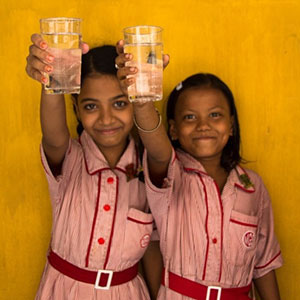
Splash, Murlidhar Girls School in Kolkata, India
Ok, I’ll admit it. I’ve seen the movie Mad Max and I fear the fictional Water War could become our reality. 1 in 9 people around the world lack access to safe water and the World Economic Forum deemed the water crisis one of the top 10 global risks likely to occur within 10 years.
As we approach World Water Day on March 22, let’s recognize the organizations, many of which are based here in Washington state, that are tackling the crisis head on and creating solutions and hope for a better future. Here are a few Global Washington members sharply focused on increasing access to clean water:
- Water 1st
- Water for Humans
- Splash
- PATH
- Living Earth Institute
- Global Brigades
- Etta Projects
- Cascade Designs/Mountain Safety Research
- Bainbridge Ometepe Sister Island Association
Also in March, Global Washington will be co-hosting experts from Central America to discuss President Obama’s $1 billion funding request for the region as a potential catalyst to improve the root causes of poverty. We’ll also host 501 Commons Executive Director Nancy Long this Thursday at our monthly Executive Director Roundtable. Nancy will present tools and services to enhance the operations of NGOs.
In the midst of resource and water scarcity, I’m inspired by the work of Global Washington members and how they’re combatting the world’s most complex problems. Washington state is truly the “Global State” of international development.

Kristen Dailey
Executive Director
Back to Top
Question of the Month
 GlobalWA will ask you a question every month and synthesize the responses and make available to our member organizations. Please take a moment to respond to the question for this month:
GlobalWA will ask you a question every month and synthesize the responses and make available to our member organizations. Please take a moment to respond to the question for this month:
World Water Day 2015 is Sunday, March 22. Is your organization holding an upcoming event to celebrate?
Please click here to respond.
Back to Top
In the News
World Water Day: March 22
By Kaitlin Marshall
On March 22, 1993, the United Nations General Assembly declared the first World Water Day (WWD). It is now an annual, global event that brings attention to water-related issues that affect people around the world. It’s a day to celebrate water, but also a day to prepare for how the global population will manage water in the future. This year’s theme is “Water and Sustainable Development,” which refers to “how water links to all areas we need to create the future we want.”
While humans can survive for weeks without food, they can only last days without water. It is necessary for survival and everyone needs a way to access a clean and stable water supply. Huge gains have been made to increase the number of people who have access to sanitary and sustainable water sources. There are, however, still 748 million people who don’t have access to an improved source of drinking water and 2.5 billion people don’t use an improved sanitation facility. Clean water is critical to disease prevention and keeping people healthy. Furthermore, water is a requirement of food production. By 2050, agriculture will need to produce 60 percent more food globally and 100 percent more in developing countries. One liter of water is needed to produce one calorie of food, and the current growth rates of agriculture demands on the world’s fresh water supply are simply unsustainable.
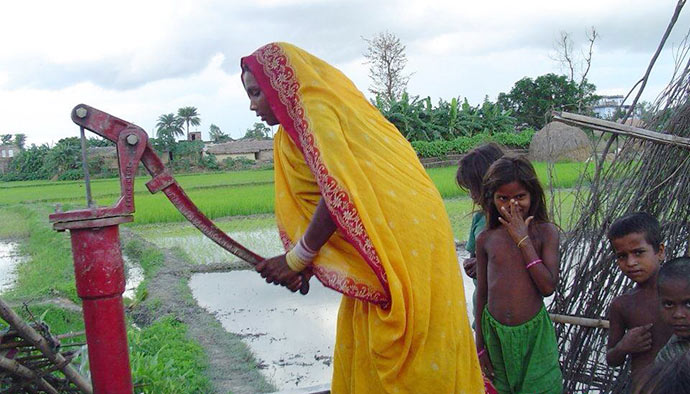
Living Earth Institute
Water, in addition to being vital to human health, is essential for populations to develop and thrive. Every manufactured product requires water and the global water demand for manufacturing is expected to increase by 400 percent from 2000 to 2050. The more companies maximize water efficiency, the more water there will be to boost industrialization in developing nations. Industrialization drives development by creating jobs and income. Investment in efficient technologies is crucial to sustain the global water supply. Without a sustainable global water supply, there is no guarantee that everyone will one day have access to the water they need to survive and continue developing.
There are 24 Global Washington member organizations dedicated to ensuring people have access to clean water. From creating dependable sanitation to building systems that bring water closer to communities, there are a myriad of ways to help create access to water. Below are several members who are working to develop innovative solutions that will bring water to those in need and ensure there is clean water for generations to come.
Cascade Designs
For over 40 years, the brands of Cascade Designs have manufactured and sold innovative, durable products. Mountain Safety Research, a Cascade Designs’ brand, partnered with GlobalWA member PATH to develop a compelling electrochlorination product for use in the developing world.
Etta Projects
Etta Projects works with local communities in Bolivia, providing them with access to clean water and sanitation training. The organization installs sustainable designs and teaches Bolivians how to maintain their water projects for future generations.
Living Earth Institute
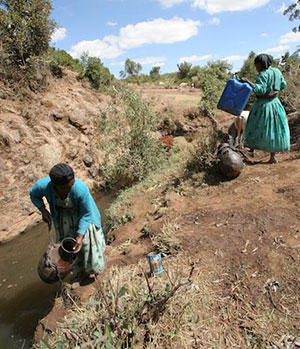
Water1st
Living Earth Institute works in southeastern Nepal and Central America developing clean water supply and leading sanitation projects. They also invest in income generation training, micro-lending programs, literacy programs and other programs deemed necessary to support the sustainability of their projects.
Splash
Splash is dedicated to ensuring children everywhere have access to clean water and works with foreign governments and businesses to create safe water projects in poor cities. By combining modern technology with hygiene education and sustainable sanitation, Splash has created an innovative solution to bring lasting water supplies to kids everywhere.
Water 1st International
By working with and listening to communities, Water 1st supports water projects in Bangladesh, Ethiopia, Honduras and India. They are committed to bringing convenient water supplies to people in need and integrating hygiene training into their projects. Water 1st applies a comprehensive evaluation system to monitor the progress of its projects.
Water for Humans
Water for Humans brings reliable sanitation and clean drinking water to underserved communities worldwide through partnerships with local and international NGOs, universities and governments. They create sustainable solutions to wastewater treatment and management, and aim to stimulate local economies and protect local water assets.
Learn more about these organizations and others on the GlobalWA Member Map. For more information on the importance of water, the global water crisis, and what you can do to help conserve water resources, visit the United Nations official World Water Day web page.
Back to Top
Featured Organization
Medical Teams International
By Danyal Lotfi
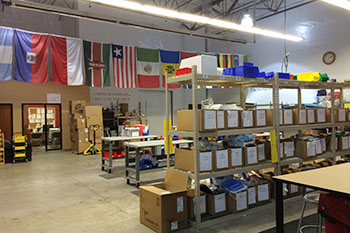 Medical Teams International (MTI), a global health, relief and development agency, was founded in 1979 by Oregon businessman Ron Post. While Post had no medical background, he felt compelled to help alleviate the mass suffering of Cambodian refugees fleeing genocide. Over the years, MTI has continued to expand and reach people in need around the globe.
Medical Teams International (MTI), a global health, relief and development agency, was founded in 1979 by Oregon businessman Ron Post. While Post had no medical background, he felt compelled to help alleviate the mass suffering of Cambodian refugees fleeing genocide. Over the years, MTI has continued to expand and reach people in need around the globe.
Since its founding, MTI has sent over 2,500 teams of volunteer medical professionals and $2 billion in medical supplies to more than 72 countries. Motivated by faith, MTI strives “to come alongside people affected by poverty, disaster and conflict, in very meaningful, impactful and sustainable ways,” just as Post did when he reached out to Cambodians over 40 years ago.
With international headquarters in Portland, OR and domestic satellite offices in Redmond, WA and Zeeland, MI, Medical Teams International focuses on responding to disasters when local infrastructure cannot meet the demand for aid. The Global Washington member provides medical services, as well as training and supplies, to vulnerable communities that lack sustainable health services. MTI’s long-term work will continue to grow more important as the organization deals with more human-driven conflict than ever before.
Three out of five of MTI’s current disaster relief projects are in response to human-driven conflicts. “The face of vulnerability is changing,” said Jeff Pinneo, who joined the organization as its President and CEO after several years on the board while working nearly three decades with Horizon and Alaska Airlines, most recently as Horizon CEO. MTI is currently working with displaced Syrians in Lebanon, Congolese Refugees in Uganda, and South Sudanese Refugees, also in Uganda.
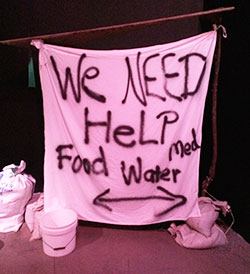 Over one million Syrians, for example, have been displaced from their homes by the conflict and forced to flee into Lebanon. MTI provides emergency medical relief to Syrian refugees and works to protect their livelihood. The Syrian MTI medical team has various projects, which include monitoring outbreaks of infectious diseases and facilitating a community-based health education program. Helping Syrians rebuild their lives is crucial as war continues to rage in the refugees’ home country.
Over one million Syrians, for example, have been displaced from their homes by the conflict and forced to flee into Lebanon. MTI provides emergency medical relief to Syrian refugees and works to protect their livelihood. The Syrian MTI medical team has various projects, which include monitoring outbreaks of infectious diseases and facilitating a community-based health education program. Helping Syrians rebuild their lives is crucial as war continues to rage in the refugees’ home country.
When asked about MTI’s operations, Director of Advancement Cindy Breilh spoke of how important teamwork is to the success of her organization. Breilh firmly believes that this culture of teamwork is vital to MTI’s ability to respond quickly to devastating disasters such as Typhoon Haiyan in the Philippines and the Ebola epidemic in Liberia. With every disaster, MTI collaborates with local governments, evaluates the disaster’s impact, and coordinates with trained volunteers to send aid within 48 hours. Even though MTI had never worked in the Philippines before the Typhoon, the team was able to quickly and successfully implement a response plan.
With every disaster response, MTI trains local health care communities to help ensure their self-sufficiency. In Liberia, MTI teams worked hard to educate Liberians on how to prevent the spread of Ebola. While the national media has largely taken over educating the public about the infectious disease, MTI continues to work with community leaders on containment strategies. This is the kind of sustainable work that Breilh and MTI are most proud of.
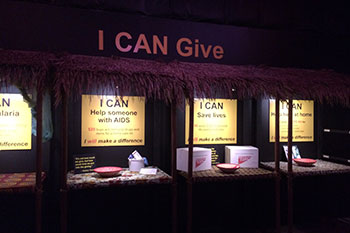 In addition to all the work MTI does globally, the organization also works to help local people in need. They operate 640 mobile dental clinics annually in Washington state, serving underserved populations in impoverished areas, particularly rural and migrant communities. MTI’s mobile dental clinics provide free or low-cost urgent dental care services to those who would otherwise not have access to such services.
In addition to all the work MTI does globally, the organization also works to help local people in need. They operate 640 mobile dental clinics annually in Washington state, serving underserved populations in impoverished areas, particularly rural and migrant communities. MTI’s mobile dental clinics provide free or low-cost urgent dental care services to those who would otherwise not have access to such services.
MTI will continue working tirelessly to achieve the organization’s goal of doubling its reach and impact by the year 2020 in saving and improving the lives of over 5.5 million of the world’s most vulnerable. With so many people and organizations in the Pacific Northwest dedicated to humanitarian efforts, MTI’s dedicated staff feels fortunate to be where they are. “It’s a great time to be engaged in global health and be based in this community,” said Pinneo.
Back to Top
Changemaker
Dmitry Sherbakov, Director of Global Outreach and Programs, The Northwest School
By Kaitlin Marshall
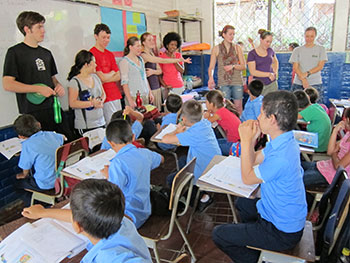
NWS students visiting a school in Northwest’s sister community, Huisisilapa, El Salvador
Dmitry Sherbakov didn’t plan on having a career with an international focus. He was born and raised in the Russian city of Cheylabinsk which, until the early nineties, was closed to foreign visitors. He received his PhD from Southern Ural State University (SUSU) and figured he would remain in the field of science his entire life. “I grew up in a family of engineers,” Sherbakov explained, “so for me it was a natural path. I did not even see another choice.”
With the collapse of the Soviet Union, however, life for Sherbakov and the city of Cheylabinsk took a turn. Cheylabinsk was opened to the outside world and, in 1992, the University of Toronto invited Sherbakov to work as a graduate assistant in its science department.
When he made the trip to Canada, it was Sherbakov’s first time studying and working abroad. He was exposed to people from an array of cultural backgrounds and experienced the rewards of international education. After his nine-month assignment ended, he returned to Russia. Sherbakov initially planned to continue his research but changed his mind after receiving an offer from SUSU to lead its new foreign affairs department. What began as a temporary job ultimately became a new career path.
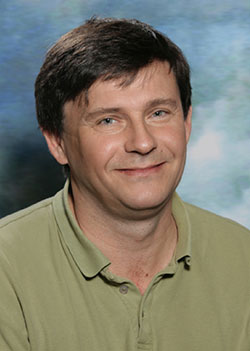
Dmitry Sherbakov
Through 1992, there was not a single international student among the 40,000 enrolled at SUSU. Sherbakov’s job was to bring international students to the university and he knew he was up to the task. “I like dealing with people, I like dealing with international students. Helping them, it’s a very cool feeling. And that’s what made me change my profession.” Since 1993, Sherbakov has worked exclusively in international education.
From 2003 to 2007, Sherbakov served as the Deputy Director of the Ford Foundation International Fellowships Program at the Institute of International Education in Russia. He then moved to the United States with his family and served as the Associate Director of International Student Recruitment at City University of Seattle from 2009-2013. Since 2013, he has worked at The Northwest School (NWS) as the Director of Global Outreach and Programs helping the school provide its students with life-changing experiences similar to the one he had in Canada over 20 years ago.
NWS was founded in 1980 to offer middle and high school students a liberal arts education that helps shape them into global citizens. The school has approximately 500 enrolled students and is the only school with an international boarding program in Seattle, which currently has about 70 international students. Domestic and international students attend classes and participate in various extracurricular activities together, which encourages them to create a global network of friends at a young age.
Students at NWS have multiple opportunities to study abroad and gain international exposure outside the classroom. NWS’s global partner network of schools and organizations in China, Ethiopia, El Salvador, France, Spain and Taiwan serves as the foundation of the school’s global learning programs, and students have the opportunity to spend an academic term abroad studying at a partner school. Every fall, exchange students from partner schools in France and Spain attend classes at NWS and live with host families. In the spring, groups of NWS students participate in culture and language immersion programs in El Salvador, France, Spain, China, and Taiwan. Last year marked the beginning of faculty exchanges between NWS and its partner schools.
A global perspective is instilled in nearly every course at NWS. Whether it is humanities, arts, math or science classes, students are exposed to a global perspective on the subject they are studying and they learn how to recognize and understand the cultural, political and economic complexities of the world. The NWS encourages students to take personal responsibility and action in dealing with global issues locally and globally. Last year, NWS students volunteered in Ethiopia, Cambodia, Israel, Thailand and Guatemala, working with girls at risk, refugee camps and local hospitals.
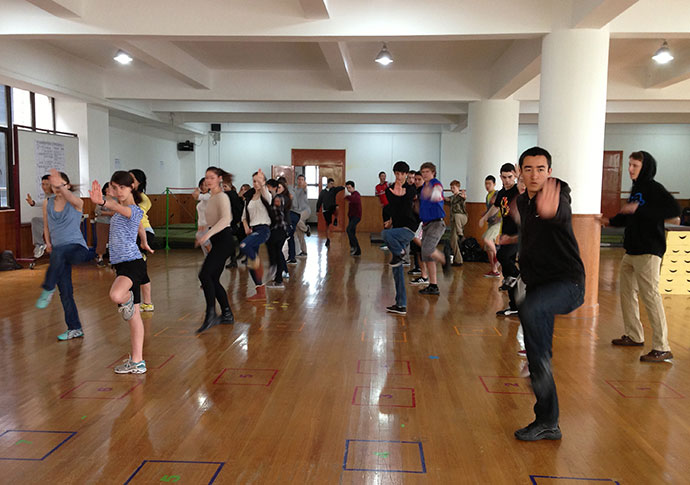
NWS students take taiji quan class at a partner school in Shanghai
Sherbakov firmly believes that everyone should study abroad at least once in their life, and advises students to embrace the experience with an open mind. He explains that when you study abroad, “you become less judgmental, more flexible, and you start realizing what is really important in your life.” He is passionate about how NWS pushes students outside of their comfort zones to be engaged with the global community. Sherbakov describes the students’ experiences studying abroad as akin to moving from a two-dimensional life to a three-dimensional one. “They start looking at things from a completely different view and they realize that things which may first look simple, are actually far more complex.”
Back to Top
Welcome New Members
Please welcome our newest Global Washington members. Take a moment to familiarize yourself with their work and consider opportunities for support and collaboration!
International Foster Care Alliance: IFCA is a nonprofit that intends to create opportunities for the United States and Japan to engage in discussions and activities to better the child welfare system. www.ifcaseattle.org
Back to Top
Member Events
March 24: Habitat for Humanity Seattle – King County // Annual Spring Luncheon
March 24 & 26: NPH USA // Faces of Hope
April 13 – 18: UW Foster School of Business // Global Business Case Competition
April 14: University of Washington // Obesity and Poverty: Linking Food, Health, and Incomes
April 25: OneWorld Now! // Get Global Youth Conference
Back to Top
Career Center
Highlighted Positions
Office Assistant – Associates in Cultural Exchange
Director of Corporate Relations and Events – Habitat for Humanity Seattle – King County
Project Administrator – PATH
For more jobs and resources, visit https://globalwa.org/resources/careers-in-development/
Back to Top
GlobalWA Events
March 19: Executive Director Roundtable
March 19: Can President Obama’s Billion Dollar Plan Change the Future of Central America?
March 19: Networking Happy Hour with Friends of GlobalWA, Humanosphere and World Affairs Council
May 20: New Member Orientation
Back to Top
March 22 is World Water Day
Posted on March 17, 2015.
By Jen Norling, Director of Development and Communications for GlobalWA member Water1st
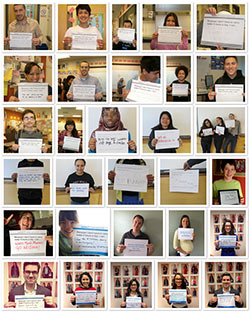
Share you picture (or video) and earn $1 for Water1st!
For 1 billion people around the world, clean water is anything but easily available. Millions of women and children spend up to 5 hours a day collecting and carrying dirty water for their families. This leaves them no time for school or other work. And very often, the water makes them sick.
What does having clean water in your home allow you to do? Go to school? Spend time with your family? Play a sport? Work at a job you love?
Because I don’t carry water every day, I can __________________.
Tell us, and tell your friends.
All you have to do is:
1. Print this form and write in your answer.
2. Take a photo (or video) of yourself with your message.
3. Share it online:
For each post/submission we receive (by midnight March 22), a generous donor will donate $1 to Water1st.
We’ll post it on our site and enter you in our contest. The person with the most shares and retweets wins a Water1st T-shirt.
Remember, each post earns $1 for Water1st — starting now!
(Deadline: midnight, March 22)
Couponing for a Cause
Posted on March 10, 2015.
By Tracey Phetsada, Mission Africa
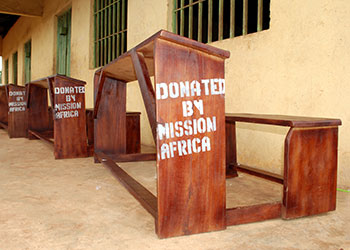 Fundraising can be a difficult task for any charitable organization, especially for the smaller ones with very limited resources. Friends Nelson Khov and Fareez Ismail understood this limitation when they created getKoupons, a consumer savings website with the sole purpose of giving back to charitable organizations. getKoupons offers an innovative method that makes charitable giving easy, and at no additional cost to donors. With over 300 partner retail stores on getKoupons.com, shoppers can find discounts, deals, coupons and promo codes for their favorite products or stores.
Fundraising can be a difficult task for any charitable organization, especially for the smaller ones with very limited resources. Friends Nelson Khov and Fareez Ismail understood this limitation when they created getKoupons, a consumer savings website with the sole purpose of giving back to charitable organizations. getKoupons offers an innovative method that makes charitable giving easy, and at no additional cost to donors. With over 300 partner retail stores on getKoupons.com, shoppers can find discounts, deals, coupons and promo codes for their favorite products or stores.
Whenever consumers begin shopping from getKoupons.com and purchase from a partner store, getKoupons receives a small referral fee from the stores. In turn, getKoupons donates 100% of its profits to charity. Throughout this month, they will donate 100% of profits to Global Washington member Mission Africa to help fund education, health care services and economic empowerment programs to assist underprivileged children and families in remote villages of Africa.
Founded ten years ago by husband and wife George-Ikoro and Ndudi Chuku, Mission Africa has now expanded its services to nine African countries including Nigeria, Tanzania, Togo, Ghana, Sierra Leone, Kenya, Gambia, Rwanda and Uganda. In 2014, Mission Africa helped 50 Nigerian students stay in school, providing all of their needs through the Mission Africa scholarship program. They provided free medical services to over 350 people, and gave free eye glasses through their medical outreach event in Amaokwe Item, Abia State, Nigeria. Mission Africa also acquired 25 plots of land in Obosima village, Imo State, Nigeria for their proposed Mission Africa health clinic.
Filed under:
Our Blog • Tagged with:
Gambia,
getKoupons.com,
Ghana,
Kenya,
Mission Africa,
Nigeria,
Rwanda,
Sierra Leone,
Tanzania,
Togo,
Uganda
On This International Women’s Day, Let’s Recognize the Value of Investing in Women and Girls
By Rainn Wilson, actor and Mona Foundation board member, for Huffington Post
Rarely does a day go by when we’re not reminded of the grave economic and political challenges facing our world. In the midst of these challenges, many community and world leaders are now recognizing what we at the Mona Foundation have known for over 15 years: Strategically investing in women and girls transforms communities and can heal the world.
Read the full article.
International Women’s Day: March 8
By Kaitlin Marshall
International Women’s Day (IWD) began as a political movement in the United States and Europe. The first IWD was spearheaded by the Socialist Party of America and was celebrated in the U.S. on February 28, 1909. Over the years, the day evolved and gained global importance. Today, it is a national holiday in many countries and has been celebrated annually by the United Nations since 1975. This year, the theme of IWD is “Make it Happen,” which is meant to encourage effective action for recognizing and advancing women.
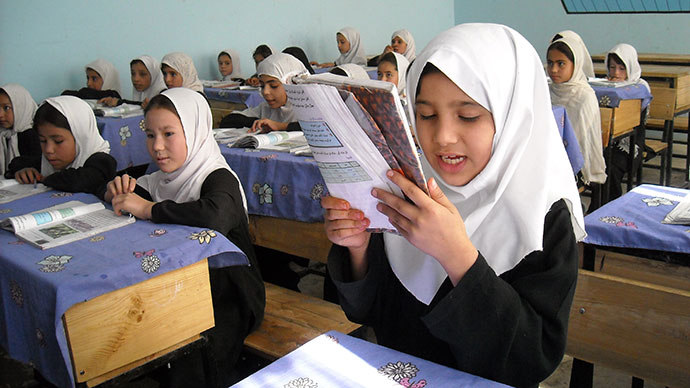
Photo Credit: Sahar
While much has changed in the 106 years since the first IWD, there is still an immense amount of work to be done. There are currently only ten women worldwide serving as heads of state and fifteen serving as heads of government. Women continue to participate in labor markets on an unequal basis with men. In 2013, the male employment-to-population ratio was 72.2 percent while the ratio for females was 47.1 percent. And, more than 700 million women alive today were married before their eighteenth birthday.
Continue Reading
Engaging Youth in Global Issues
Posted on February 23, 2015.
By Kirsten Rogers, OneWorld Now!
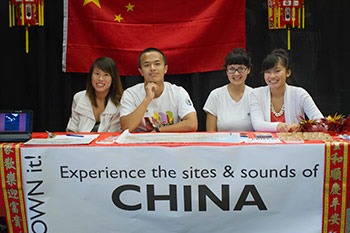 At the heart of international education is the goal of meaningfully engaging students in global issues, a daunting task when faced with the competing interests on high school students’ minds: SATs, college applications, after-school jobs and who to ask to homecoming. For well over a decade, Global Washington member OneWorld Now! has used world languages, experiential leadership workshops, and study abroad to bring the world to Seattle high-school students, draw their attention to global issues, and inspire them to take action for positive change. Below are a few tips and anecdotes to engage youth in global issues.
At the heart of international education is the goal of meaningfully engaging students in global issues, a daunting task when faced with the competing interests on high school students’ minds: SATs, college applications, after-school jobs and who to ask to homecoming. For well over a decade, Global Washington member OneWorld Now! has used world languages, experiential leadership workshops, and study abroad to bring the world to Seattle high-school students, draw their attention to global issues, and inspire them to take action for positive change. Below are a few tips and anecdotes to engage youth in global issues.
Continue Reading
February 2015 Newsletter
Posted on February 17, 2015.
Welcome to the February 2015 issue of the Global Washington newsletter.
IN THIS ISSUE
Letter from our Executive Director
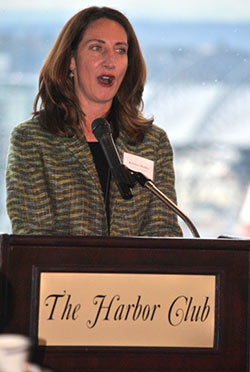 Only 17% of attendees at last month’s World Economic Forum in Davos were women. This is discouraging if we are to believe that WEF stands for equity and economic growth worldwide. In contrast, 97% of attendees at this month’s Global Washington and Waldron co-sponsored event were women. Rosario Perez, CEO of Pro Mujer and a panelist at our event after returning from WEF in Davos, exemplifies why we need more female leaders in the nonprofit and philanthropic communities. Renee Kaplan from the Skoll Foundation and Dean Sandra Archibald from the Evans School of Public Affairs at UW joined Ms. Perez on the panel. Each shared candid views and personal stories about their rise to leadership roles. Over 100 women (and a few good men) participated in the conversation.
Only 17% of attendees at last month’s World Economic Forum in Davos were women. This is discouraging if we are to believe that WEF stands for equity and economic growth worldwide. In contrast, 97% of attendees at this month’s Global Washington and Waldron co-sponsored event were women. Rosario Perez, CEO of Pro Mujer and a panelist at our event after returning from WEF in Davos, exemplifies why we need more female leaders in the nonprofit and philanthropic communities. Renee Kaplan from the Skoll Foundation and Dean Sandra Archibald from the Evans School of Public Affairs at UW joined Ms. Perez on the panel. Each shared candid views and personal stories about their rise to leadership roles. Over 100 women (and a few good men) participated in the conversation.
As we approach International Women’s Day on March 8, I’d like to highlight the 44 Global Washington members working in 130 countries to improve the lives of women and girls. These organizations address issues such as education, access to clean water, healthcare, land rights, economic development, and human rights. Please take a moment to learn more about these groups on our Member Map.
And, if you are moved to further support high-impact nonprofits based in our region improving lives abroad, I hope you will take a look at the newly released Global Philanthropy Guide. It provides insights on the effective organizations that call Washington their home and the world their workplace, many of which work with women and children and are Global Washington members.
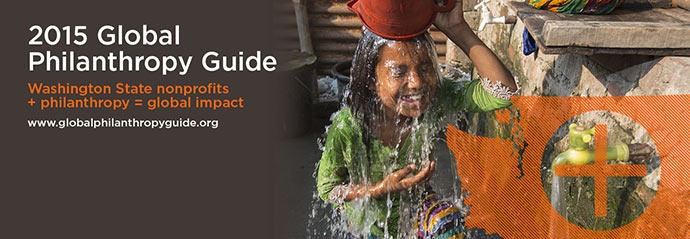 Investing in women is often found to be the most effective means to reduce poverty in developing countries. In fact, the World Bank has data to demonstrate that “gender equality and economic development are inextricably linked.” The data showed that “equality not only guarantees basic rights but also plays a vital role in promoting the robust, shared growth needed to end extreme poverty in our increasingly competitive, globalized world.”
Investing in women is often found to be the most effective means to reduce poverty in developing countries. In fact, the World Bank has data to demonstrate that “gender equality and economic development are inextricably linked.” The data showed that “equality not only guarantees basic rights but also plays a vital role in promoting the robust, shared growth needed to end extreme poverty in our increasingly competitive, globalized world.”
I’m proud that Washington state has so many remarkable organizations that empower women worldwide, and is home to women leaders promoting women-centered development.
Sincerely,

Kristen Dailey
Executive Director
Back to Top
Question of the Month
 GlobalWA will ask you a question every month and synthesize the responses and make available to our member organizations. Please take a moment to respond to the question for this month:
GlobalWA will ask you a question every month and synthesize the responses and make available to our member organizations. Please take a moment to respond to the question for this month:
Is your organization looking for new board member(s)?
Please click here to respond.
Back to Top
Women in the News
Leaders in Philanthropy Inspire Audience to ‘Turn and Pull’
By Danyal Lotfi
 Professionals from a diverse cross-section of industries gathered on February 5 to hear from three established women leaders in academia, the non-profit sector and philanthropy. Over 100 women and a handful of supportive men engaged in a discussion co-hosted by Waldron and Global Washington.
Professionals from a diverse cross-section of industries gathered on February 5 to hear from three established women leaders in academia, the non-profit sector and philanthropy. Over 100 women and a handful of supportive men engaged in a discussion co-hosted by Waldron and Global Washington.
The panelists included Dr. Sandra Archibald, Dean of the Evans School of Public Affairs at University of Washington; Renee Kaplan, Chief Strategy Officer at Skoll Foundation; and Rosario Perez, President and CEO of Pro Mujer. Global Washington Executive Director Kristen Dailey kicked off the event and Melissa Merritt, Vice President of Waldron and a member of Global Washington’s Board of Directors, moderated the conversation.
Each panelist opened with a brief story about her journey to social sector leadership. They spoke about the importance of persistence and resilience in the face of adversity. Dr. Archibald proudly shared her strategy of identifying boundaries and then tackling them head-on, because, “[my] parents taught me not to be afraid of much, which is fundamental to being able to break boundaries.”
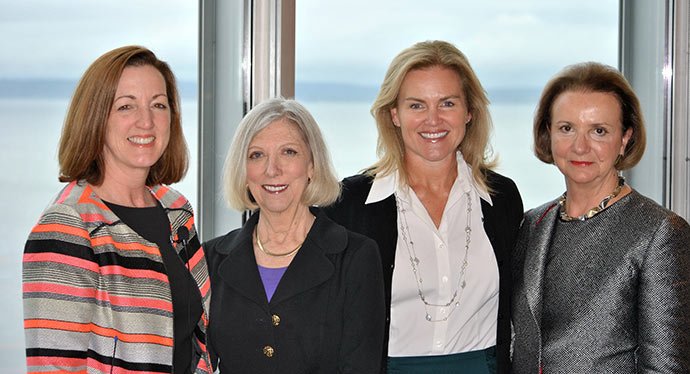 The panelists also addressed Sheryl Sandberg’s controversial yet pertinent book, Lean In. Kaplan was quick to give her perspective. “I was fired up after reading that book, [because] we are [already] taking on so much.” Kaplan believes that women need to set healthy boundaries for themselves and that the culture around work/life balance needs to change. Dr. Archibald added that a career path is a jungle gym rather than a ladder. “Know that if you take a step back, you still have that jungle gym that you can climb as far as you want to take it.”
The panelists also addressed Sheryl Sandberg’s controversial yet pertinent book, Lean In. Kaplan was quick to give her perspective. “I was fired up after reading that book, [because] we are [already] taking on so much.” Kaplan believes that women need to set healthy boundaries for themselves and that the culture around work/life balance needs to change. Dr. Archibald added that a career path is a jungle gym rather than a ladder. “Know that if you take a step back, you still have that jungle gym that you can climb as far as you want to take it.”
Perez and Kaplan both argued that “you can’t have it all, all the time” and that you often have to make tough choices. Perez believes there is a strong need for more support services that allow women to better balance their work and family responsibilities.
When asked about professional mentorship, the speakers all agreed on its importance. Perez advised everyone to seek a sponsor in his or her workplace. She challenged the audience to bring women’s sponsorship initiatives directly to their supervisors; company-wide women’s sponsorships have shown to be more effective than mentorship in preliminary studies. Dr. Archibald discussed how she chooses her mentees, telling the audience that she looks for someone who takes initiative and interest in her work and, if she’s confident in their ability and work ethic, she will sponsor that person for years to come.
While Dr. Archibald acknowledged the progress in women’s professional advancement over the last several decades, she added that the barriers women faced used to be very obvious, but now exist in a more subtle way. These barriers, she believes, are often hidden in criteria for leadership and executive roles.
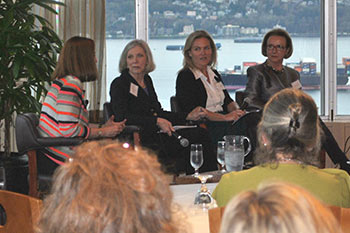 During the audience Q&A, a participant asked, “How do we get more women into public policy?” Dr. Archibald spoke of the extensive efforts already underway to encourage young people, especially young women, to seek careers in public policy. “We can create the environment and we can try to change the culture. Women come at public policy from a very different perspective. If you encourage women to get into public policy, you get those perspectives.”
During the audience Q&A, a participant asked, “How do we get more women into public policy?” Dr. Archibald spoke of the extensive efforts already underway to encourage young people, especially young women, to seek careers in public policy. “We can create the environment and we can try to change the culture. Women come at public policy from a very different perspective. If you encourage women to get into public policy, you get those perspectives.”
Dr. Akhtar Badshah, a Global Washington Board member and one of the few men present at the event, asked the panelists whether they’ve seen any backlash in the countries they work in because of the growing focus on programs to promote women’s empowerment. Pointing to women’s rights campaigns in India and Senegal, Kaplan spoke of how an initial backlash can happen but can also be overcome. She stressed that having women who are indigenous leaders is critical to any program success. Kaplan believes it’s essential to allow indigenous leaders, familiar with local culture and social dynamics, to pursue changes on the ground.
In closing remarks, Kaplan recounted a phrase coined by former U.S. Women’s National Soccer Team Captain Julie Foudy. “We have to do the ‘turn and pull.’ Sometimes you have to turn and pull [other women] forward, because that’s one of the most important and effective ways of helping one another.”
Back to Top
Featured Organization
Hands for Peacemaking Foundation
By Charlotte Dawkins
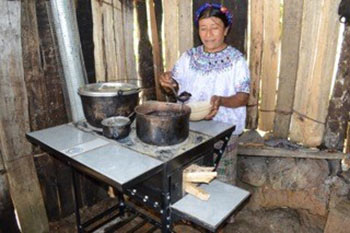 Santa Cruz Barillas is a city in the mountainous region of Huehuetenango in western Guatemala, close to the Mexican border. Agriculture is the largest source of revenue in Barillas, and the average worker makes between $3.50 and $6.00 per day. Although high levels of poverty plague the area, it is also rich in biological and ethnic diversity. Most of the people living in Barillas are Maya and speak the Mayan dialect called Q’anjob’al or Kanjobal. In the entire country, a total of 22 different Mayan dialects are spoken.
Santa Cruz Barillas is a city in the mountainous region of Huehuetenango in western Guatemala, close to the Mexican border. Agriculture is the largest source of revenue in Barillas, and the average worker makes between $3.50 and $6.00 per day. Although high levels of poverty plague the area, it is also rich in biological and ethnic diversity. Most of the people living in Barillas are Maya and speak the Mayan dialect called Q’anjob’al or Kanjobal. In the entire country, a total of 22 different Mayan dialects are spoken.
Over the past eight years, Barillas has seen the exploitation of local resources by foreign companies. The area has been identified as a rich source of metals, hydro power and petroleum, and successive administrations have courted international investment from Colombia, Canada and Spain. There are now approximately fifteen hydroelectric dams in various stages of planning and development in the area, as well as plans for oil extraction and mining.
Hands for Peacemaking Foundation, an Everett-based non-profit and Global Washington member, was created by Leeon Aller, MD and his wife Virginia in 1985. Aller, a family physician from Snohomish, WA, travelled to Guatemala as part of the National Guard and became passionate about helping those living in remote areas of the country. The focus of Hands for Peacemaking is to help provide opportunities for economic development, improve health conditions, and increase access to education by installing water supplies, building storage tanks, latrines, schools, school materials, and cooking stoves.
“On top of citizens not having an education, most of them don’t know how to get out of poverty. It’s passed down from generation to generation and, since most have such large families, the cycle of poverty just keeps on going,” said Pete Kinch, Hands for Peacemaking’s Executive Director, on his foundation’s current focus. “We’re trying really hard to break that cycle.”
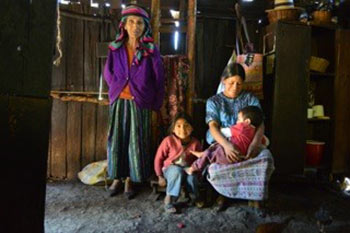 The Mission Center, located in Barillas, is Hands for Peacemaking’s center of operations, providing a space for work teams to launch into surrounding villages. The nearby Aller Skill Center is a place to teach locals employable skills and is where the foundation’s products are built.
The Mission Center, located in Barillas, is Hands for Peacemaking’s center of operations, providing a space for work teams to launch into surrounding villages. The nearby Aller Skill Center is a place to teach locals employable skills and is where the foundation’s products are built.
“The education system has vastly improved from when I first went down there in 2000. At that time, they would complete the first grade and would then go out and work in the fields. Now it’s up to the sixth grade, and even university level with five universities in town — Universidad Davinci, Universidad San Carlos de Guatemala, Universidad Panamericana, Universidad Rural de Guatemala and Universidad Mariano Galvez. We hope that by building schools and helping people get an education in the villages, their schooling will eventually continue through high school.” In 2014, the foundation built two more two-classroom schools and has built over 11,000 school desks to date, becoming the largest manufacturer of desks in the Barillas area.
Another product, the Aler stove, was created by the foundation as an alternative to the commonly used indoor open fire, which is known to cause respiratory illness and death. This high-efficiency stove vents outside and is estimated to burn 65% less wood than open fires. Over 1,200 stoves have been built to date.
Hands for Peacemaking is committed to involving Guatemalans throughout each step of the product development process. “All of the work we do, they have to perform or pay a portion thereof,” said Kinch. “We’ve found that the ‘something for nothing’ mentality doesn’t benefit anybody, and that it’s really important for the Guatemalans to participate” For example, an Aler stove costs $200, of which the villagers will pay $20. Once they pay off their stove, they own it. It’s important to them because they have invested in that stove.
It’s the same with schools. Guatemalans have to buy the land and help build the school so they have ownership of it. “When we come back two to three years later and the school has been painted multiple times, it’s a strong clue they have taken ownership and are very much involved in the value of it,” said Kinch. “It’s not just our school.”
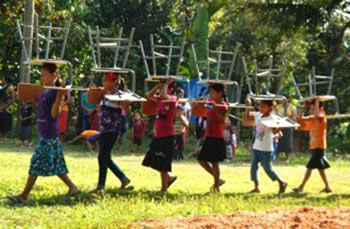 Two Hands for Peacemaking projects on the horizon are updating their old Land Cruiser, which is used to transport groups from Guatemala City to their work area, and getting more funding for a continuing project in the village of El Porvenir. “We’re putting in water tanks that will be able to store 2,500 liters of water that was caught in the rainy season and make it available during part of the dry season. It will save time from not having to continuously go down the mountain to the river which is five to six miles away. We were able to raise money for half the village and we would like very much to raise $15,000 to do the second half of the village.”
Two Hands for Peacemaking projects on the horizon are updating their old Land Cruiser, which is used to transport groups from Guatemala City to their work area, and getting more funding for a continuing project in the village of El Porvenir. “We’re putting in water tanks that will be able to store 2,500 liters of water that was caught in the rainy season and make it available during part of the dry season. It will save time from not having to continuously go down the mountain to the river which is five to six miles away. We were able to raise money for half the village and we would like very much to raise $15,000 to do the second half of the village.”
Kinch believes that Hands for Peacemaking has a unique ability to help Guatemalans because, as he says, “We’ve been there a long time and consistently, whereas most of the other organizations have come and gone.” “We’ve continued to stay,” said Kinch.
Though poverty is endemic in the region, Hands for Peacemaking is doing something about it. They have been highly effective at both providing job opportunities and building products that make life easier for those living in the rural villages of Guatemala, and will continue to do so for years to come.
Back to Top
Changemaker
Jacinta Tegman, President, World Concern
By Kaitlin Marshall
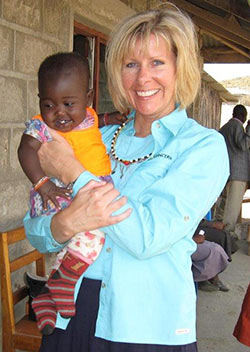 As media outlets keep pace with a 24-hour news cycle, images of suffering and devastation around the globe fill the airwaves each and every day. One can easily become paralyzed wondering how they can have an impact on the world when there are countless people who need help. “One story at a time,” advises Jacinta Tegman, President of Global Washington member World Concern. For Tegman, global impact starts with changing the life of just one individual.
As media outlets keep pace with a 24-hour news cycle, images of suffering and devastation around the globe fill the airwaves each and every day. One can easily become paralyzed wondering how they can have an impact on the world when there are countless people who need help. “One story at a time,” advises Jacinta Tegman, President of Global Washington member World Concern. For Tegman, global impact starts with changing the life of just one individual.
Tegman was born and raised in the Seattle area. Her parents were Northern European immigrants and their connection to the international community exposed Tegman early on to different cultures and backgrounds. The global perspective Tegman developed growing up quickly became ingrained in her life and motivated her to look for opportunities for international work.
After “settling into the American dream” with her family, as Tegman describes, she took stock of her life. She wondered, “Is just having all this stuff really what I’m about?” Tegman’s search for answers took her to central Mexico where she and her husband served as missionaries for nine years. While in Mexico, they witnessed how poverty and hunger prevent people from realizing their full potential. The experience lit a fire in Tegman.
After returning to the United States, Tegman joined a church staff and, over time, found herself developing a sense of restlessness. Nearly a decade after her missionary service ended, she decided to shift her career path. Living in Mexico for over a decade made Tegman realize that her life “had more meaning and purpose then just [her] own personal comfort.” She wanted to once again work somewhere where she could utilize her ambition to bring aid and meaning to people’s lives. Tegman looked for an organization that supported her personal aspirations and whose mission matched her own passions. In June 2008, Tegman became the Donor Relations Director at World Concern.
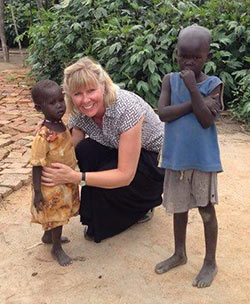 Founded in 1955, World Concern this year celebrates 60 years of serving the poor overseas. Since its founding, the organization has continuously expanded. Today it has community development and disaster response projects in twelve countries, the majority of which are in Asia and Africa. The organization strives to provide opportunity and hope in some of the world’s poorest, hard-to-reach places. It balances immediate relief efforts with a focus on development projects that will help communities flourish long-term.
Founded in 1955, World Concern this year celebrates 60 years of serving the poor overseas. Since its founding, the organization has continuously expanded. Today it has community development and disaster response projects in twelve countries, the majority of which are in Asia and Africa. The organization strives to provide opportunity and hope in some of the world’s poorest, hard-to-reach places. It balances immediate relief efforts with a focus on development projects that will help communities flourish long-term.
In addition to serving as World Concern’s Donor Relations Director, Tegman also held the role of Senior Director of International Operations before becoming president of the organization in October 2013. Says Tegman, “We help those living in extreme poverty…and yet we do it in a way that gives dignity and value to the people we serve. It isn’t just a handout, but it’s helping people to uncover their own potential. At the core, we’re all human beings and we all want the opportunity to grow and flourish.”
The idea that change starts with impacting just one life is integral to Tegman’s leadership style. While visiting unreached communities in Sri Lanka this past summer, Tegman stopped in an isolated village where countless children roamed the beach unsupervised. Many of their mothers had resorted to prostitution to survive. One little girl stands out in her memory. “Her father had died, her mother had abandoned her, and she was living with grandparents who were too old to care for her. She was alone and so vulnerable,” recalled Tegman.
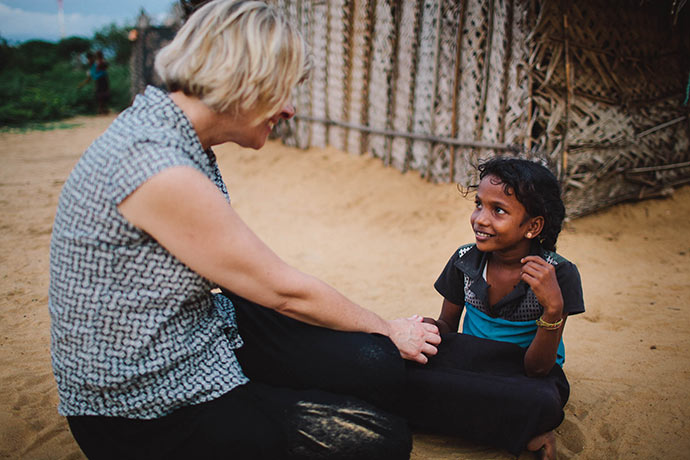 The face of that little girl is etched in Tegman’s memory. She realized that, even if she could help just that one child, she would be making a difference. “I remember promising our country director that, whatever it took, we would care for and protect that little girl,” said Tegman. And she kept that promise. In late 2014, World Concern started a child protection program in this village.
The face of that little girl is etched in Tegman’s memory. She realized that, even if she could help just that one child, she would be making a difference. “I remember promising our country director that, whatever it took, we would care for and protect that little girl,” said Tegman. And she kept that promise. In late 2014, World Concern started a child protection program in this village.
Tegman encourages others interested in international development to avoid thinking broadly because it can be paralyzing. “Think of that little girl who is without a parent right now, who is lost and alone and suffering. Start with caring about that one life.”
Back to Top
Welcome New Members
Please welcome our newest Global Washington members. Take a moment to familiarize yourself with their work and consider opportunities for support and collaboration!
Cascades Level
Alliance for Children Everywhere: Alliance for Children Everywhere (ACE) is a 501(c)(3) Christian nonprofit founded in 1969 under the name House of Samuel. In Zambia, ACE operates two rescue homes for abandoned infants, orphans and young children in crisis. ACE provides assistance to extended families, acts as adoption advocates, provides infant formula to babies at risk of abandonment or starvation, and offers free Christian education to children who cannot attend school due to family poverty. www.childreneverywhere.org
Amigos de Santa Cruz Foundation: Amigos is a nonprofit working to improve education, health and economic development in the indigenous communities of Santa Cruz la Laguna, Guatemala. www.amigosdesantacruz.org
Washington Nonprofits: Washington Nonprofits builds strong, collaborative network of nonprofits serving Washington communities through advocacy, education and capacity building. www.washingtonnonprofits.org
Back to Top
Member Events
February 19: US Fund for UNICEF // Not My Life screening and panel discussion
February 20-23: Community Colleges for International Development // CCID 39th Annual Conference
February 21: NPH USA // Carnival for a Cause
February 26: Shoreline Community College // Myths of Globalization
February 28: Mobility Outreach International // 12th Annual Steps to Healing auction and gala
March 5: Village Health Works // 2015 Strength in What Remains Dinner
March 13: Landesa // 9th Annual Seed the Change Luncheon
Back to Top
Career Center
Highlighted Paid Positions
In-Country Director – Amigos de Santa Cruz Foundation
Information Systems Officer – Global Partnerships
Lead Software Developer – Grameen Foundation
Director of Development – PeaceTrees Vietnam
For more jobs and resources, visit https://globalwa.org/resources/careers-in-development/
Back to Top
GlobalWA Events
February 18: New Member Orientation
February 19: Executive Director Roundtable
February 26: Networking Happy Hour with Friends of GlobalWA, Humanosphere and World Affairs Council
Back to Top
An Adventure With A Cause: PhotoPhilanthropy with Landesa in India
Posted on February 10, 2015.
Nancy Farese, Social documentary photographer, founder of PhotoPhilanthropy.org, for Huffington Post
A small group of world-class photographers set out to capture images of some of Global Washington member Landesa’s projects in India.
Read the full article.
Who Can You Trust With Donor Dollars?
Eighteen GlobalWA organizations selected for 2015 Global Philanthropy Guide
Posted on February 10, 2015.
By Mauricio Vivero
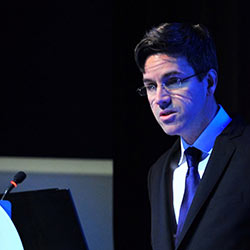 Trust matters, and when it breaks down, bad things happen. This plays out on many levels. We trust that police will protect, not harm, citizens. We trust our elected officials will act in our best interests. We trust that a coach will make the right call to lead our team to victory.
Trust matters, and when it breaks down, bad things happen. This plays out on many levels. We trust that police will protect, not harm, citizens. We trust our elected officials will act in our best interests. We trust that a coach will make the right call to lead our team to victory.
Trust is also critical in the world of philanthropy, especially when giving to causes and communities that are half a world away. Donors often cannot see the results of these investments firsthand, and the work happens in places that can be rife with corruption and political instability, where poverty is entrenched and its causes are complicated.
The world of global do-gooders is littered with high-profile flops, which further strains trust. Just last year, both Invisible Children, which created the wildly popular viral Kony 2012 video, and the Somaly Mam Foundation, named after the much-lauded campaigner against international sex trafficking, announced the end or radical downscaling of operations. These announcements followed very public criticisms of their claims and impact, and dramatic funding backlashes.
Continue Reading
Bridging the Gap Between First and Second Curve Social Investments and Philanthropy
Posted on February 3, 2015.
By Akhtar Badshah, PhD
Akhtar Badshah was presented the 2014 Global Hero Award by Global Washington founder Bill Clapp at GlobalWA’s 6th Annual Conference on December 3, 2014. Below is a full transcript of Akhtar’s acceptance speech.
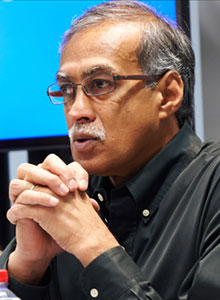 Thank you very much for this recognition. I am very grateful for being called the Global Washington Hero – but I am no hero. I want to thank both Paula and Bill Clapp for their lifetime work in creating institutions that have had both direct impact and have also become centers of innovation that are being emulated by others.
Thank you very much for this recognition. I am very grateful for being called the Global Washington Hero – but I am no hero. I want to thank both Paula and Bill Clapp for their lifetime work in creating institutions that have had both direct impact and have also become centers of innovation that are being emulated by others.
I have been very fortunate to have been given the opportunity to work in the space of global development for the last 30 years – whether it has been in the early part of my career looking at cities, informal settlements, housing for the poor, and urban revitalization, which I reflected upon in my book Our Urban Future – New Paradigms for Equity and Sustainability; or when I started a social enterprise, and later heading Microsoft’s philanthropic programs.
Continue Reading


![]() GlobalWA will ask you a question every month and synthesize the responses and make available to our member organizations. Please take a moment to respond to the question for this month:
GlobalWA will ask you a question every month and synthesize the responses and make available to our member organizations. Please take a moment to respond to the question for this month:

 Medical Teams International (MTI), a global health, relief and development agency, was founded in 1979 by Oregon businessman Ron Post. While Post had no medical background, he felt compelled to help alleviate the mass suffering of Cambodian refugees fleeing genocide. Over the years, MTI has continued to expand and reach people in need around the globe.
Medical Teams International (MTI), a global health, relief and development agency, was founded in 1979 by Oregon businessman Ron Post. While Post had no medical background, he felt compelled to help alleviate the mass suffering of Cambodian refugees fleeing genocide. Over the years, MTI has continued to expand and reach people in need around the globe. Over one million Syrians, for example, have been displaced from their homes by the conflict and forced to flee into Lebanon. MTI provides emergency medical relief to Syrian refugees and works to protect their livelihood. The Syrian MTI medical team has various projects, which include monitoring outbreaks of infectious diseases and facilitating a community-based health education program. Helping Syrians rebuild their lives is crucial as war continues to rage in the refugees’ home country.
Over one million Syrians, for example, have been displaced from their homes by the conflict and forced to flee into Lebanon. MTI provides emergency medical relief to Syrian refugees and works to protect their livelihood. The Syrian MTI medical team has various projects, which include monitoring outbreaks of infectious diseases and facilitating a community-based health education program. Helping Syrians rebuild their lives is crucial as war continues to rage in the refugees’ home country. In addition to all the work MTI does globally, the organization also works to help local people in need. They operate 640 mobile dental clinics annually in Washington state, serving underserved populations in impoverished areas, particularly rural and migrant communities. MTI’s mobile dental clinics provide free or low-cost urgent dental care services to those who would otherwise not have access to such services.
In addition to all the work MTI does globally, the organization also works to help local people in need. They operate 640 mobile dental clinics annually in Washington state, serving underserved populations in impoverished areas, particularly rural and migrant communities. MTI’s mobile dental clinics provide free or low-cost urgent dental care services to those who would otherwise not have access to such services.



 Fundraising can be a difficult task for any charitable organization, especially for the smaller ones with very limited resources. Friends Nelson Khov and Fareez Ismail understood this limitation when they created getKoupons, a consumer savings website with the sole purpose of giving back to charitable organizations. getKoupons offers an innovative method that makes charitable giving easy, and at no additional cost to donors. With over 300 partner retail stores on getKoupons.com, shoppers can find discounts, deals, coupons and promo codes for their favorite products or stores.
Fundraising can be a difficult task for any charitable organization, especially for the smaller ones with very limited resources. Friends Nelson Khov and Fareez Ismail understood this limitation when they created getKoupons, a consumer savings website with the sole purpose of giving back to charitable organizations. getKoupons offers an innovative method that makes charitable giving easy, and at no additional cost to donors. With over 300 partner retail stores on getKoupons.com, shoppers can find discounts, deals, coupons and promo codes for their favorite products or stores.
 At the heart of international education is the goal of meaningfully engaging students in global issues, a daunting task when faced with the competing interests on high school students’ minds: SATs, college applications, after-school jobs and who to ask to homecoming. For well over a decade, Global Washington member OneWorld Now! has used world languages, experiential leadership workshops, and study abroad to bring the world to Seattle high-school students, draw their attention to global issues, and inspire them to take action for positive change. Below are a few tips and anecdotes to engage youth in global issues.
At the heart of international education is the goal of meaningfully engaging students in global issues, a daunting task when faced with the competing interests on high school students’ minds: SATs, college applications, after-school jobs and who to ask to homecoming. For well over a decade, Global Washington member OneWorld Now! has used world languages, experiential leadership workshops, and study abroad to bring the world to Seattle high-school students, draw their attention to global issues, and inspire them to take action for positive change. Below are a few tips and anecdotes to engage youth in global issues. Only 17% of attendees at last month’s World Economic Forum in Davos were women. This is discouraging if we are to believe that WEF stands for equity and economic growth worldwide. In contrast, 97% of attendees at this month’s Global Washington and Waldron co-sponsored event were women. Rosario Perez, CEO of Pro Mujer and a panelist at our event after returning from WEF in Davos, exemplifies why we need more female leaders in the nonprofit and philanthropic communities. Renee Kaplan from the Skoll Foundation and Dean Sandra Archibald from the Evans School of Public Affairs at UW joined Ms. Perez on the panel. Each shared candid views and personal stories about their rise to leadership roles. Over 100 women (and a few good men) participated in the conversation.
Only 17% of attendees at last month’s World Economic Forum in Davos were women. This is discouraging if we are to believe that WEF stands for equity and economic growth worldwide. In contrast, 97% of attendees at this month’s Global Washington and Waldron co-sponsored event were women. Rosario Perez, CEO of Pro Mujer and a panelist at our event after returning from WEF in Davos, exemplifies why we need more female leaders in the nonprofit and philanthropic communities. Renee Kaplan from the Skoll Foundation and Dean Sandra Archibald from the Evans School of Public Affairs at UW joined Ms. Perez on the panel. Each shared candid views and personal stories about their rise to leadership roles. Over 100 women (and a few good men) participated in the conversation. Investing in women is often found to be the most effective means to reduce poverty in developing countries. In fact, the World Bank has
Investing in women is often found to be the most effective means to reduce poverty in developing countries. In fact, the World Bank has 
 The panelists also addressed Sheryl Sandberg’s controversial yet pertinent book, Lean In. Kaplan was quick to give her perspective. “I was fired up after reading that book, [because] we are [already] taking on so much.” Kaplan believes that women need to set healthy boundaries for themselves and that the culture around work/life balance needs to change. Dr. Archibald added that a career path is a jungle gym rather than a ladder. “Know that if you take a step back, you still have that jungle gym that you can climb as far as you want to take it.”
The panelists also addressed Sheryl Sandberg’s controversial yet pertinent book, Lean In. Kaplan was quick to give her perspective. “I was fired up after reading that book, [because] we are [already] taking on so much.” Kaplan believes that women need to set healthy boundaries for themselves and that the culture around work/life balance needs to change. Dr. Archibald added that a career path is a jungle gym rather than a ladder. “Know that if you take a step back, you still have that jungle gym that you can climb as far as you want to take it.” During the audience Q&A, a participant asked, “How do we get more women into public policy?” Dr. Archibald spoke of the extensive efforts already underway to encourage young people, especially young women, to seek careers in public policy. “We can create the environment and we can try to change the culture. Women come at public policy from a very different perspective. If you encourage women to get into public policy, you get those perspectives.”
During the audience Q&A, a participant asked, “How do we get more women into public policy?” Dr. Archibald spoke of the extensive efforts already underway to encourage young people, especially young women, to seek careers in public policy. “We can create the environment and we can try to change the culture. Women come at public policy from a very different perspective. If you encourage women to get into public policy, you get those perspectives.” Santa Cruz Barillas is a city in the mountainous region of Huehuetenango in western Guatemala, close to the Mexican border. Agriculture is the largest source of revenue in Barillas, and the average worker makes between $3.50 and $6.00 per day. Although high levels of poverty plague the area, it is also rich in biological and ethnic diversity. Most of the people living in Barillas are Maya and speak the Mayan dialect called Q’anjob’al or Kanjobal. In the entire country, a total of 22 different Mayan dialects are spoken.
Santa Cruz Barillas is a city in the mountainous region of Huehuetenango in western Guatemala, close to the Mexican border. Agriculture is the largest source of revenue in Barillas, and the average worker makes between $3.50 and $6.00 per day. Although high levels of poverty plague the area, it is also rich in biological and ethnic diversity. Most of the people living in Barillas are Maya and speak the Mayan dialect called Q’anjob’al or Kanjobal. In the entire country, a total of 22 different Mayan dialects are spoken. The Mission Center, located in Barillas, is Hands for Peacemaking’s center of operations, providing a space for work teams to launch into surrounding villages. The nearby Aller Skill Center is a place to teach locals employable skills and is where the foundation’s products are built.
The Mission Center, located in Barillas, is Hands for Peacemaking’s center of operations, providing a space for work teams to launch into surrounding villages. The nearby Aller Skill Center is a place to teach locals employable skills and is where the foundation’s products are built. Two Hands for Peacemaking projects on the horizon are updating their old Land Cruiser, which is used to transport groups from Guatemala City to their work area, and getting more funding for a continuing project in the village of El Porvenir. “We’re putting in water tanks that will be able to store 2,500 liters of water that was caught in the rainy season and make it available during part of the dry season. It will save time from not having to continuously go down the mountain to the river which is five to six miles away. We were able to raise money for half the village and we would like very much to raise $15,000 to do the second half of the village.”
Two Hands for Peacemaking projects on the horizon are updating their old Land Cruiser, which is used to transport groups from Guatemala City to their work area, and getting more funding for a continuing project in the village of El Porvenir. “We’re putting in water tanks that will be able to store 2,500 liters of water that was caught in the rainy season and make it available during part of the dry season. It will save time from not having to continuously go down the mountain to the river which is five to six miles away. We were able to raise money for half the village and we would like very much to raise $15,000 to do the second half of the village.” As media outlets keep pace with a 24-hour news cycle, images of suffering and devastation around the globe fill the airwaves each and every day. One can easily become paralyzed wondering how they can have an impact on the world when there are countless people who need help. “One story at a time,” advises Jacinta Tegman, President of Global Washington member
As media outlets keep pace with a 24-hour news cycle, images of suffering and devastation around the globe fill the airwaves each and every day. One can easily become paralyzed wondering how they can have an impact on the world when there are countless people who need help. “One story at a time,” advises Jacinta Tegman, President of Global Washington member  Founded in 1955, World Concern this year celebrates 60 years of serving the poor overseas. Since its founding, the organization has continuously expanded. Today it has community development and disaster response projects in twelve countries, the majority of which are in Asia and Africa. The organization strives to provide opportunity and hope in some of the world’s poorest, hard-to-reach places. It balances immediate relief efforts with a focus on development projects that will help communities flourish long-term.
Founded in 1955, World Concern this year celebrates 60 years of serving the poor overseas. Since its founding, the organization has continuously expanded. Today it has community development and disaster response projects in twelve countries, the majority of which are in Asia and Africa. The organization strives to provide opportunity and hope in some of the world’s poorest, hard-to-reach places. It balances immediate relief efforts with a focus on development projects that will help communities flourish long-term. The face of that little girl is etched in Tegman’s memory. She realized that, even if she could help just that one child, she would be making a difference. “I remember promising our country director that, whatever it took, we would care for and protect that little girl,” said Tegman. And she kept that promise. In late 2014, World Concern started a child protection program in this village.
The face of that little girl is etched in Tegman’s memory. She realized that, even if she could help just that one child, she would be making a difference. “I remember promising our country director that, whatever it took, we would care for and protect that little girl,” said Tegman. And she kept that promise. In late 2014, World Concern started a child protection program in this village. Trust matters, and when it breaks down, bad things happen. This plays out on many levels. We trust that police will protect, not harm, citizens. We trust our elected officials will act in our best interests. We trust that a coach will make the right call to lead our team to victory.
Trust matters, and when it breaks down, bad things happen. This plays out on many levels. We trust that police will protect, not harm, citizens. We trust our elected officials will act in our best interests. We trust that a coach will make the right call to lead our team to victory. Thank you very much for this recognition. I am very grateful for being called the Global Washington Hero – but I am no hero. I want to thank both Paula and Bill Clapp for their lifetime work in creating institutions that have had both direct impact and have also become centers of innovation that are being emulated by others.
Thank you very much for this recognition. I am very grateful for being called the Global Washington Hero – but I am no hero. I want to thank both Paula and Bill Clapp for their lifetime work in creating institutions that have had both direct impact and have also become centers of innovation that are being emulated by others.